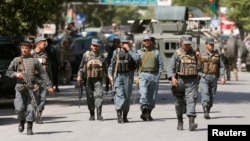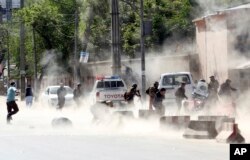Afghan authorities said heavily armed suicide bombers assaulted two police stations Wednesday in Kabul, killing at least seven people and wounding 23 others.
The first attack took place midday, during which two suicide bombers targeted the police headquarters in western Dasht-e-Barchi district of the capital, said Afghan Interior Minister Wais Ahmad Barmak.
One assailant blew himself up while the other was challenged and gunned down by security forces, Barmak said. The Afghan Ministry of Public Health confirmed the killing of at least four people, and said another nine were wounded. Members of the security force were said to be among those killed and wounded.
Islamic State, through its Amaq News Agency, took responsibility for plotting the violence, though it provided no evidence to substantiate the claim.
About 30 minutes later, a group of at least five gunmen wearing suicide vests stormed a police station in central Kabul’s upscale Shahr-e Naw area.
Officials confirmed the death of three security personnel, while 14 others were wounded.
Police officials said a suicide bomber detonated his explosives in a bid to enable four other assailants in a motor vehicle to enter the facility. But Afghan security forces quickly challenged them and forced them to take refuge in a nearby building before killing all of the militants in a shootout that lasted about eight hours.
The Taliban insurgency claimed its members carried out the attack and killed many officers and personnel of Afghan security and intelligence agencies. Insurgent casualty tolls often are inflated.
The National Directorate of Security, the Afghan spy agency, blamed the Haqqani network and the banned Lashkar-e-Taiba militant group, both allegedly based in Pakistan, for planning the Shahr-e Naw attack. But the agency provided no immediate evidence.
Pakistani officials have yet to respond to the allegations. Just hours after the attacks, the Pakistani foreign ministry strongly condemned what it called "the senseless and heinous terrorist attacks in Kabul. "Such blatant terrorism targeting innocent civilians and disrupting way of life has no justification whatsoever," it said, reiterating that Pakistan stands ready to extend all possible counterterrorism cooperation to Afghanistan.
Witnesses and Afghan officials expected the overall causality figures from Wednesday's attacks to increase.
Repeated militant attacks in Kabul have worried its residents and refueled criticism of the government for failing to prevent the violence. Afghan media quoted shopkeepers, cab drivers and others in the city as saying their businesses have suffered, and they have limited outdoor activities due to serious safety concerns.
“It is a week in which people are scared, when they want to visit Shahr-e-Naw area, but we don’t have other options except working here with fear,” Obaidullah, a taxi driver, told TOLOnews station.
Earlier this month, an attack in Kabul that included a secondary explosion in a crowd that gathered after a first explosion, killed more than 25 people, including nine journalists. The Islamic State group claimed responsibility.
Violence in Afghanistan has surged since the Taliban launched its annual spring offensive, dubbed as "Al Khandaq," two weeks ago.
In a briefing Monday to the Afghan parliament, Afghan defense and interior ministers said more than 250 Afghan troops had died in various Taliban attacks across the country in the span of a week.
The officials also said their troops had killed 800 Taliban insurgents since late April.
Since launching its spring offensive, the Taliban also has overrun at least four Afghan districts and threatened several others.
Insurgent spokespeople have disputed official claims that Afghans security forces have retaken the lost territory.





